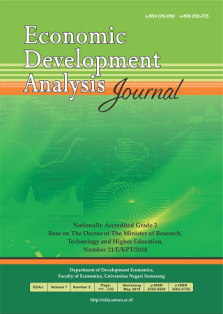Impact of Program Keluarga Harapan on Child Labor During Covid-19
Abstract
This research examines the impact of the Program Keluarga Harapan (PKH), a conditional cash transfer program, on child labor in Indonesia. The study focuses on the periods before and during the COVID-19 pandemic, using data from the National Socioeconomic Survey (Susenas) from March 2019 to 2021. The study specifically looks at children aged 10-17 from economically vulnerable families living in urban and rural areas. The research employs the Propensity Score Matching (PSM) technique to determine the impact of PKH on child labor participation as a response to economic shocks and school closures during the pandemic. The findings indicate that while PKH provides financial assistance to families, it has not significantly reduced child labor during the pandemic or before. Despite an increase in the amount of aid and changes to monthly distributions during the pandemic, the proportion of working children has increased, especially in urban areas, where child labour rates have significantly risen compared to rural areas. This research emphasizes the need for comprehensive policy strategies to reduce reliance on child labor as a coping strategy during crises.


